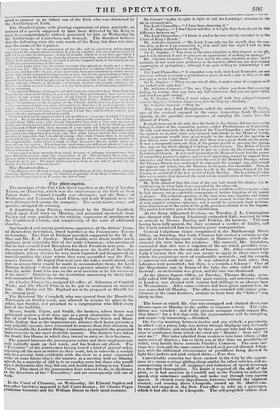In the Court of Chancery, on Wednesday, Sir Edward Sugden
and two other banisters appeared in full Court dresses ; Sir Charles Pepys (Solicitor. General) and Sir William Horne in their usual costume. Sir Edward augden tin ught it right to call his Lordship's attention to the ale ye circumstance. The Lord Chancellor—" I have been observing it." Sir E. Sugden.“ I don't know whether it is right that there should be this difference between us." The Lord Chancellor—" I know it used to be very strictly attended to io die Court of King's Bench."
Mr. Solicitor-General—" My Lord, I can only say for myself, that the ma- son of it, as far as I am concerned, is, that until late last night I had no Asa your Lordship would have sat to-day."
wrrhecil Sir E. Sugden—" You were in the same situation in that respect as we al; and l otply mention it now to give you an opportunity of making an apology." Mr. Solicitor- General—" No, I was not in the same situation as you ; arra PI certainly do not want your politeness to be taxed to afford me any unneressly opportunity of apologizing ; although I am quite willing to acknowledge I ase ord Chancellor—" I remember very well, that Lord Tenterden, on /Mr occasion, refused to permit a gentleman to move on such a day as this, as head, not appear in his Court dress." Sir E. Sugden—,, When we are not all alike, it makes some of us appear as if we wished to be very fine."
Mr. solieitor-General—" No, no; I beg to relieve you from that ananyieg feeling, by stating, that you have my full concession that you are quite ries, and that I mit quite wrong." Sir E. Sugden—" Then I must solace myself with that acknowledgmeat rout his Majesty's Solieitor-General on this his Majesty's birthday."
Mr. General—" Pray do."
The sonic day, Lord Brougham called the attention of Mr. lisAfte, Ono of tins counsel engaged in the cause respecting Lady Howley's charity, to the possible consequences of carrying the cause iute the House of Peers.
It might turn out in the end, that the funds in the charity did not neees‘arily belong to either of the contending- parties—either Presbyterians or Iinitarises. Ile hail read attentively the judgment of the Vice-Chancellor ; and he come to the opinion on it, that some very eminent individuals in the House of Lords, whose judgments would have great weight in the decision of the question be that liouse, were inclined to think that there was a great doubt on the Froint. It may emsequently turn out that, if the parties persist in pressing the appall, they may see the fillets adjudged to belong to the Crown. The House of Lerdar may call upon the Attorney-General to put in a claim for the Crown and the Established Church. It was well known that the House of Lords had the pewee of compelling parties to appear, and even of appointing counsel to support the;rr interests ; and they had exercised it in the case of the Berkeley Peerage, where Sir Thomas Phonier was nomivated to represent the younger son, who wonld not appear, and where, too, Sir Thomas, on his part, was successful. Now, the present ease, it might be necessary to call in the Attorney-General for the Crown, or on behalf of the heir at law of Lady Bewley. His Lordship thought this was a matter that deserved the most serious consideration of those who were pressing the appeal.
Mr. Rolfe admitted that this view of the ease had struck his clients; inn la: could not say in what light it was regarded by the other side.
The Lord Chancellor repeated, that the parties would do well to consider ulna he had thrown out as a probable consequence of further litigation of the points in dispute. The religious opinions of the time were very singular, and widely different from each other. Lady llewley herself seemed to have been a person, of very singular religious opinions ; and it would be extremely bard to deter- mine what was to be the creed of the godly preachers alluded to in the bequest. The parties had better give it their consideration.
At the Sorry Adjourned Sessions, on Tuesday, J. L. Cunningham was charged with having feloniously embezzled 350/., received by bine as servant to Messrs. Barclay and Perkins, the brewers. The case having been fully proved, the Jury returned a verdict of Guilty, :rod the Court sentenced him to fourteen years' transportation.
General Colquhoun Grant complained at the Marlborough Street Office, on Saturday, that Lady Channon had erected a veranda on the outside of her drawing-room windows in Hanover Square, whieh oh- structed the view from his windows. His counsel, Mr. Adolphus, contended that this was a violation of the act which prohibits orna- mental 'projections on the outside of houses. Mr. Alley contended for Lady Channon that the act was meant to apply to those cases only where the projections were of combustible materials ; and the veranda ie question was made of iron. It was admitted on both sides, that balconies were permitted ; but then, is a veranda a balcony? One of the Magistrates was in favour of the lady, the other sided with the General: so no decision was given, and the case was dismissed.
At the Queen Square Office, on Tuesday, Thomas Beendy, gene- rally called Old Bandy, one of the most cunning and notorious coulees in London, was charged with coining bad shillings in au obscure /me in Westminster. After some evidence had been given against him, he was rempinded till Monday. The office was crowded with junior prac- titioners in the same business, anxious to learn how the "father" was likely to fare.




















 Previous page
Previous page